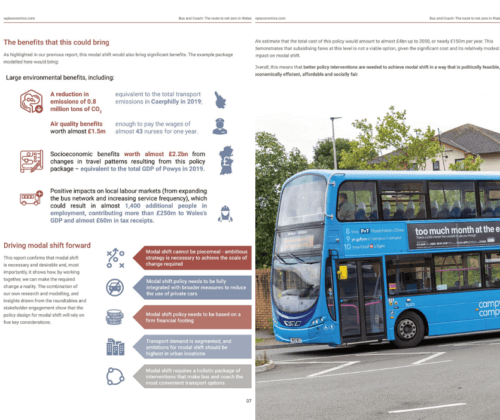
If the UK doesn’t switch car journeys to bus and coach, net zero CO2 targets won’t be met, says a new report
A new WPI Economics report comissioned by the CPT shows how major benefits could be reaped by levelling the playing field between private motoring and public transport. The report follows on from a study which showed that attracting drivers to switch some journeys to bus or coach was necessary to meet net zero targets, a move it says would produce significant economic, social and health benefits and be achievable given the current support for tackling climate change.
With a general 70-year decline in bus travel, the report says that focusing on one policy alone won’t be sufficient. It shows how increasing motoring costs in isolation would hit those who don’t have any other option to use their cars, particularly lower earners. Instead, making bus travel free would cost billions without having a significant impact on people’s travel choices, it said.
The report calls for a realistic, fair and politically achievable package of policies to encourage people to switch two car journeys a month to bus or coach. This will ensure a reduction in England alone of 10m tons of CO2, equivalent to the entire annual transport emissions of the East Midlands, it says.
As well as keeping the country on the path to net zero, moving more people onto bus and coach unlocks huge benefits including £18bn of benefits from reduced congestion, £9bn in health benefits, 58,000 new jobs and £3.6bn additional GDP through better connectivity to job and services, the report suggests.
Research Director at WPI Economics Matthew Oakley explained: “A holistic policy package combining an urgent range of sensible interventions will make buses and coaches the natural choice over cars. Without a significant step
change to Government policy, current decarbonisation targets will not be met.”
Alison Edwards, Director of Policy at the Confederation of Passenger Transport, added: “Meeting the 2050 Net Zero deadline can only be achieved if there is long-term investment in the funding of services and infrastructure, so that bus and coach travel can become people’s preferred transport of choice. UK decision-makers should not park bus policy packages, but see them as fair and achievable measures to slash carbon, generate new tax revenue, create more jobs and make people healthier.”
To meet decarbonisation targets, bus packages across England must cover three key policy areas, with license to adapt according to local needs, the CPT says: Investment in bus services and infrastructure to increase attractiveness of the bus network, building on local authority plans to deliver the National Bus Strategy; subsidising bus fares; and charging motorists to drive in congested urban areas.
One way to achieve this could be to combine £1bn per year investment in bus services with a £2 fare cap and a congestion charge in urban local authorities, the organisation said, which could take England three quarters of the way to its net zero goal while making buses faster, cheaper and more convenient.
It believes the urban congestion charge would raise sufficient revenue to pay for other elements of the package, provide targeted support to help motorists meet the cost and help the Government in moving away from a dependency on fuel duty. Such policies could reverse England’s 11% passenger decline per decade between 1980 and 2019, increasing bus patronage by 25% per decade up to 2050, the CPT says.
Combining measures across the three policy areas could also help British cities overtake their European counterparts in productivity; their failure to do so is caused by severe congestion in urban areas from cars that costs the UK economy £23 billion a year, added the CPT.

